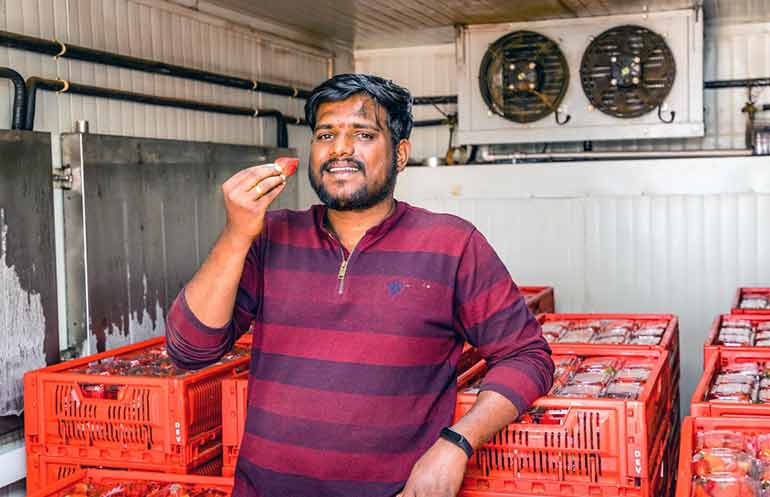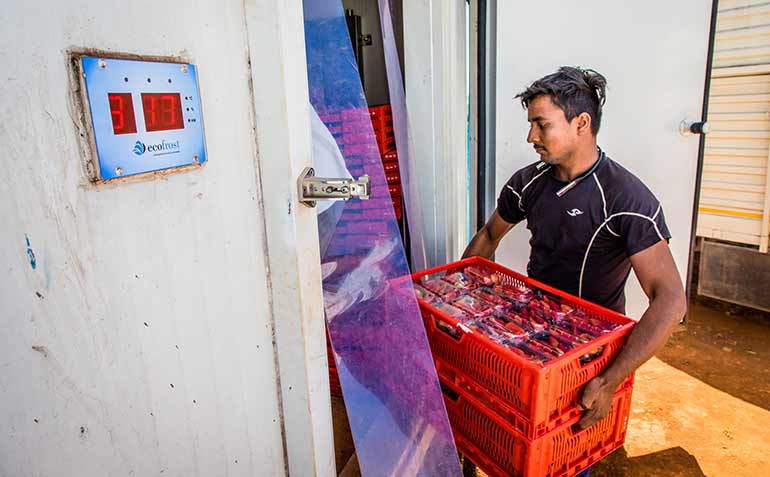Solar fridge provides lifeline for Indian farmers
7th July 2021
INDIA: Three portable solar-powered cold rooms have provided a lifeline to small-scale strawberry farmers in India beset by the coronavirus pandemic.
2021 has been a traumatic year for India’s farmers – coronavirus has slashed their incomes, and they face the impact of controversial new agriculture policies.
For strawberry growers in Mahabaleshwar, in the state of Maharashtra, a cutting-edge green technology by Indian company Ecozen has been a lifeline, protecting the small-scale farmers most at risk.
Mahabaleshwar, known as India’s strawberry capital, is home to just over 10,000 people but produces 85% of India’s strawberries – close to 20,000 tonnes of the fruit are harvested every year.
Here and across India, many poorer farmers lack efficient, affordable cold storage for the food they grow. Earlier this year, when dramatic lockdown restrictions closed markets and limited consumer spending, these marginalised farmers faced disaster. Local tourism and demand for ice cream – both of which create opportunities for strawberry farmers – were also badly hit.
In Mahabaleshwar, farmers faced a loss of around US$2.7m as they were unable to preserve and sell their produce in the domestic market, or export it.
But the arrival of three portable solar-powered cold rooms has allowed even small-scale farmers in the district to meet demand in the huge cities of Mumbai and Pune – as well as the further afield markets of Bangalore, Kochi and Chennai. Farmers are able to rent small amounts of space in the cold rooms – the perfect solution for those with few savings to invest in large-scale storage.

The cold rooms are the creation of Indian agritech startup Ecozen, who are now working with 100 farmers in the region. The Pune-based company has also launched an Eco Connect strawberry collection centre in the village of Bhillar, extending the cold chain that puts money in the pockets of strawberry farmers. Digital technology helps Ecozen and their customers ensure strawberries are kept in the best possible condition.
Ecozen are a partner in climate solutions charity Ashden’s Fair Cooling Fund programme working with low carbon innvators around the world to scale up the impact of fair cooling solutions that benefit small scale farmers.
The company’s standalone Ecofrost units run on 5kW of solar power. If it’s cloudy, the unit automatically switches to the available alternative power supply, be that its inbuilt thermal storage, the grid or alternative power supply from a generator set.
The thermal energy based technology provides backup of up to 30 hours and charges itself completely within as little as 5-6 hours.
The Ecofrost operates a temperature range of 4-10˚C and humidity control range of 65-95%.

Crucial
The arrival of the cold rooms proved crucial when most commercial buyers, without the means to manage strawberries for transportation over long distances, withdrew from the area in late February. With many tonnes of the fruit still to be sold, Ecozen continued their support to farmers until late March.
Strawberry farmer Amar Chowdhary said: “Now we don’t depend on the Mumbai market. That keeps going up and down, whereas Ecozen ensures the price of strawberries at the time of delivery. I have gained at least 20 rupees ($0.27) per kilogramme this season. Our Strawberries were sent to Bangalore by Ecozen. In the next season, we want to work with them to sell to distant markets like Chennai and Kochi.”
Ecozen intends to increase its work with Mahabaleshwar’s strawberry farmers ahead of the next harvesting season in November.
Ecozen CEO and co-founder Devendra Gupta said: “We are delighted to support strawberry farmers at such a critical time. Across India and beyond, lack of cold chain is a big barrier to rural development. As climate change pushes temperatures higher, the problem will only get worse. Our technology brings security and new opportunities to producers and growers of all kinds.”
In November Ecozen received a grant of $100,000 from the Fair Cooling Fund. This initiative from climate solutions charity Ashden, backed by K-CEP, is widening access to affordable, sustainable cooling among those most at risk from extreme heat.







